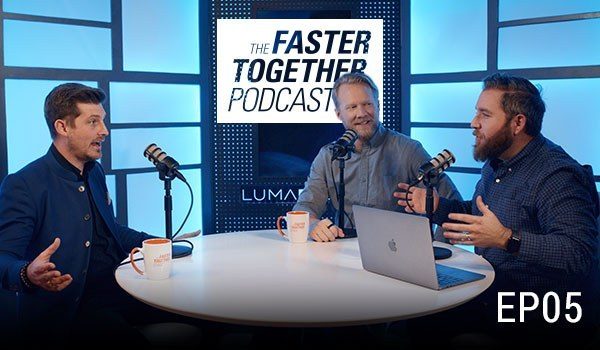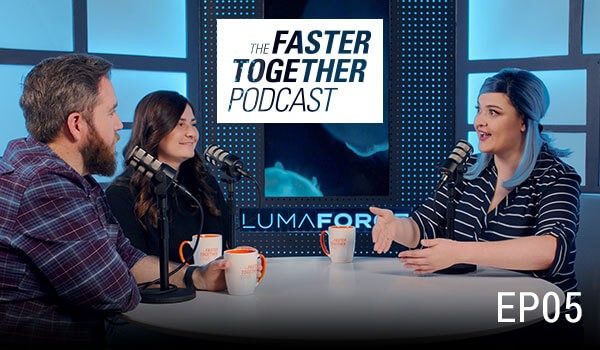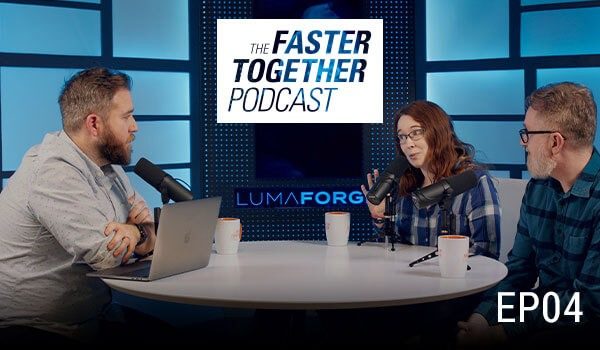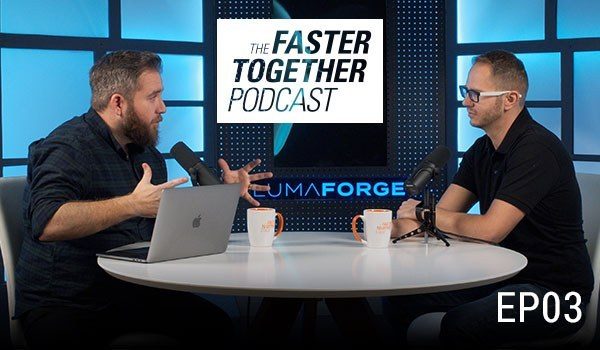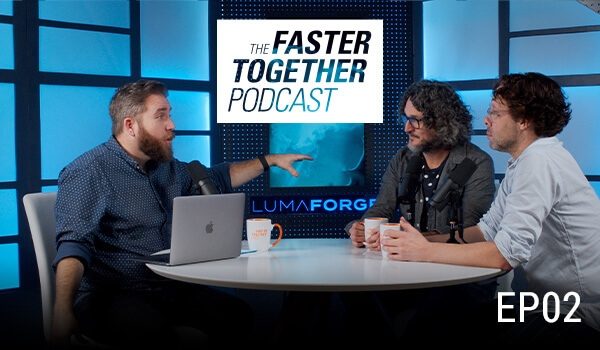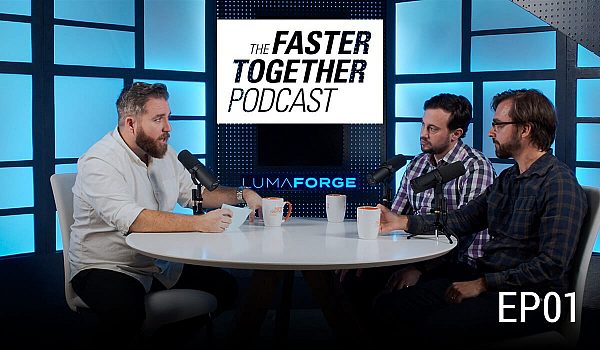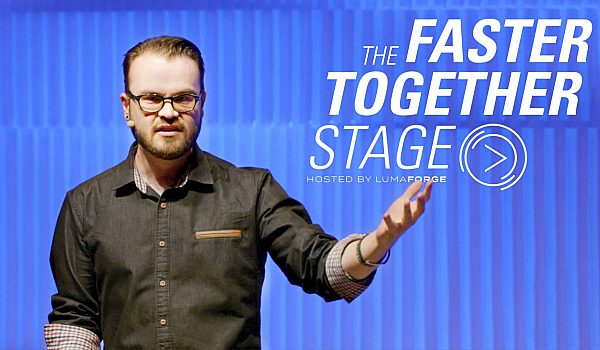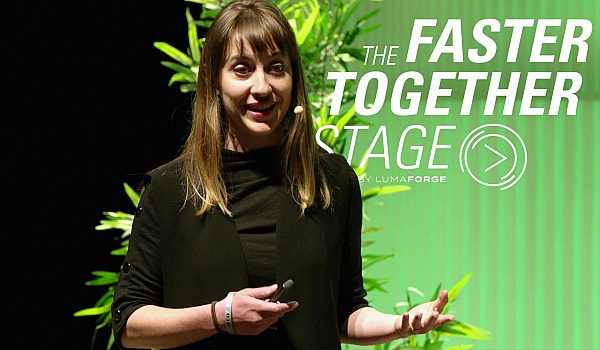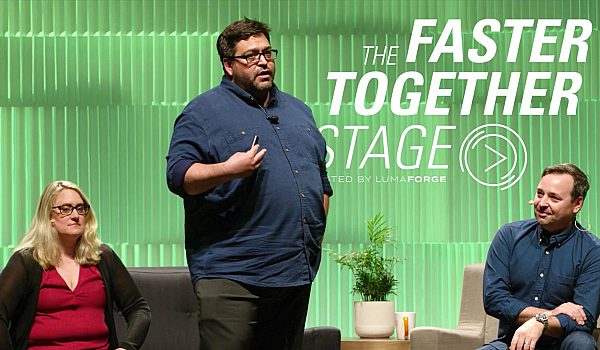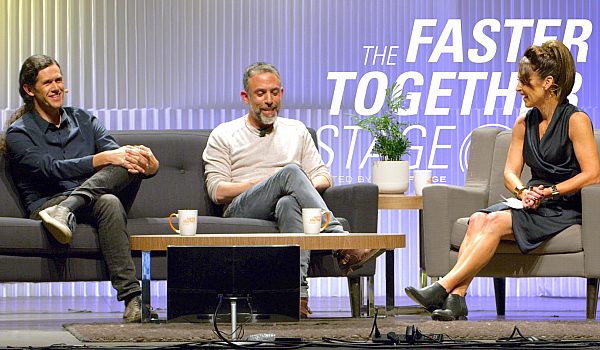Sam Mestman from LumaForge discusses the importance of failure as a teaching tool in the world of filmmaking. He explores the idea of reframing failure as iteration and how iteration has impacted his own journey as a filmmaker.
I am Sam Mestman from LumaForge, and above all else, welcome to Faster Together 2019. We are really, really excited to have you. We have an amazing show planned. And basically, tonight is going to be about becoming a better storyteller. It's going to be about talking about how we made our last thing, what the state of our tools was when we made it, and where we want those tools to go so we can create something even better next time, with a larger community to show it to. It's also going to be about how much power each one of us has to change our worlds, as long as we have the courage to walk through the fire, live our truth, and make the most of everything life puts in front of us. In order to be a great visual storyteller, or filmmaker, or content creator, or whatever exactly it is we call ourselves these days, you've got to be able to take the idea that's in your head, decide what you want to communicate to your audience, picture the best way to do it, and then you need to go out in the world and have a million things go right so that the images match your intention. That's great storytelling and it's not easy. And it's also why we give so much respect to the people who do it well.
Being great at what you do requires the willingness to put yourself out there, time after time, to get comfortable in the uncomfortable and to put your work out in front of a group of people you respect and be okay with their judgment of you. You've got to move past your fear and your ego and be willing to take in their feedback, their criticism, all of the barbs, all of the flattery, all of the awkwardness and uncertainty, and then take that and get better, stronger, and smarter so you can put it into the next version, the final master, and then you create the next thing, that should be 10 times better than what you just did based on all the lessons you just learned. And in order to do that, you need to have the willingness to do the one thing most people are completely terrified to do in this world. You need to fail. In fact, you need to fail a lot. And everybody hates to fail, and no one likes when others talk about something they did like it was a failure.
We all hate feeling incompetent and like we don't know what we're doing. We want to project the image like we've got it all under control. Our society demands a fear of failure. We hate being laughed at and we're all just terrified of being in one of those blooper videos on YouTube, like the lady who was stomping grapes and fell off the platform on live TV, or the guy who said the immortal words, "Boom goes the dynamite!" If you don't know what I'm talking about, there's Google. You're welcome. Enjoy after this speech.
Anyway, it is burned into our brains that we should be terrified what others are going to think of us, and that we have to create this image of ourselves that we know everything and that we need to fake it 'til we make it. And I think the term that's really going around this these days is imposter syndrome. So if you only take one thing away from this, I'm here to tell you that fake-it-'til-you-make-it is a lie, and it's something designed to keep you small, ineffective, and powerless because you're afraid to take a risk. You're too afraid to fail. Having the courage to fail in front of all of your fears and in front of all the people you care about is actually the fire you need to walk through in order to become great at what you do. But here's the cool thing about this, though, which is, once you start getting in the habit of failing, it really doesn't hurt as much. In fact, it becomes a little bit of a sport or an experiment. And you start to realize that failing is just a sign of your own personal growth, and that, the faster you fail, the faster you get really good at things.
So if the thought of standing in front of a room full of people and having something really bad happen terrifies you, there's an actual trick you can use for that. And that's, every time you say the word failure, say iteration instead. Replace the word failure with iteration. So let's just go ahead and use me as an example. I've failed spectacularly so many times I don't even know how to count them anymore. All of those failures really, really hurt at the time, but now I don't even remember the bad parts because I've done it so often and I'm pretty much immune to the feeling. The reason for that is, when I changed the word failure, instead, to iteration, it doesn't quite sting so bad, and it gives you the strength to keep growing and keep learning because you know it's just part of the process. So here's just a few example of iteration from my own life. My initial life's plan that I egotistically laid out for myself was that I was going to beat the odds and become a big Hollywood director that had made three feature films by the time I was 27. So I went to what everyone told me was the best film school in the world, and when I graduated, I began my life's dream by working at Applebee's in my hometown in New Jersey.
Based on that, my expectations iterated pretty quickly, so that I actually got excited when I got to move up in the world and transfer to the Times Square Applebee's and move back to New York. From there, I eventually got fired at that Applebee's, I iterated, and immediately began my illustrious directing career by directing camp videos. I went on to direct and edit a documentary that never saw the light of day because I got into an argument over the best way to iterate the documentary with the executive producer. We quietly both iterated onto other things. After that, I boldly iterated into raising $400,000 and leveraging every relationship I had in my life to produce, edit, and color a friend's independent film, appropriately titled How I Got Lost. This was supposed to lead me to directing my first feature, but instead, it iterated into bad distribution, sad investors, crippling debt, maxed-out credit cards during the financial crisis, and finding myself in a new city, Los Angeles, with absolutely zero prospects.
Rock bottom came when I sadly iterated my way into a Los Angeles Final Cut Pro User Group in 2008, and looked at the person next to me and asked how I could get a job editing in Los Angeles. So at this point, you are probably sitting there, saying, "That's a lot of really impressive iterations, Sam, "but it doesn't seem like something "I really wanna do myself. "I'm not sure why you're telling how sad your life was. "There's a lot of people with way more sad stories "than you, anyway, so can you please get to the point?" So here's the point. Iteration makes you invincible. The experience of my movie-going up in flames should have been my reason to quit. It should have exposed me as a fake, a loser, and as someone with no talent who is never going to succeed or live any of my dreams. And I could've quit and no one would've blamed me. They would've agreed that I had spent too much time iterating with no results to show for it.
Instead, it was at exactly that time that my iterations started to pay off. I looked around that LAFCPUG meeting and I saw a community, and I saw there were others like me who had as bad, if not worse, stories than me, and I decided I wanted to build a place where people could find a way to make the impossible happen and tell their stories without compromising. So I decided to keep iterating, and that's when things got fun, because I learned to iterate fast and cheap. And so I took my last $300 and I started a filmmaking community called We Make Movies. It started with a bunch of broke people reading each others' scripts every three months, and 10 years later, it is now a community-funded production company with a free-to-attend weekly workshop that has seen hundreds of shorts, features, web series, sketches, and pilots, and just about every other thing you can imagine come out of it, and that took a lot of iteration. But because I was broke and I needed to learn how to make movies cheap at We Make Movies, I'd iterate and get good at the technical and organizational side of editing and color correction because they were the hardest and most expensive things to learn.
That iterated, somehow, into getting lucky enough to work at Apple with the Final Cut team for a bit, a lot of whom are in this room right now. Thank you guys. And they taught me how to iterate software, experiment, find reproducible bugs, and take all of my workflows to the next level as a filmmaker. From there, I started making tutorials because I realized no one knew how to use Final Cut X properly at the time and it might be a good way to market myself. People seemed to like those for some reason, and the next thing I knew, I'd iterated my way into my first NAB, demoing Final Cut on shared storage, but I didn't even know what that was at the time, and integrating x-ands, and creating Final Cut Pro X pro workflows in places like Bulgaria and for Will Smith movies in Hollywood. That iterated again into doing TED talk-style presentations of Final Cut X, with FCP Exchange and FCPWORKS. And so the next thing I knew, I found out the world needed affordable, easy-to-use shared storage that could run Final Cut X, and that iterated into founding LumaForge, and figuring out how to take servers out of the server room, and make something really complicated and difficult into a product simple enough that someone like me could use.
That iterated into the first-ever Faster Together at NAB, where the projector didn't work so well, and it was being done out of a really small, really warm room in the Mariott across the street from the convention center. That iterated into Faster Together being on the show floor last year and having our product, the Jellyfish, becoming available on the Apple Store this past December and seeing LumaForge become a multimillion-dollar company with Jellyfish servers changing workflows for hundreds of teams around the world and more than 20 countries on six continents. So more that 15 years after beginning my career at Applebee's and still never getting a shot to direct my movie, I managed to iterate into something better than what I thought I ever could get before I started embracing my own failure. I somehow managed to iterate my way into building my own filmmaking community and company where I get to work and hang out with the most amazing group of people I've ever had the privilege to know, and who go above and beyond every day to take a company that never should've existed and make it into something I never thought could be possible.
That is the power of iteration, and that is why I just took all this time here to egotistically whine on stage in from of you. So here's the thing. If I had been afraid of failure and what other people were gonna think of me, I never would've learned the true meaning of the word iteration, which is how I like to refer to failure now. So here's my definition of iteration. Iteration is the time between imagining you can accomplish something and actually doing it. And my hope for all of you tonight, and the real purpose of Faster Together, is that you will spend tonight taking in all of the presentations from these amazing people, hearing their stories, and you will find something tonight that helps you go back to wherever you live and work, that allows you to iterate faster, cheaper, and help you achieve something you never thought possible in your own life and career.


 Mobile
Mobile
 Tower
Tower
 R24
R24
 Builder
Builder
 Manager
Manager
 Connect
Connect
 Kyno
Kyno
 Media Engine
Media Engine
 Remote Access
Remote Access
 Support
Support
